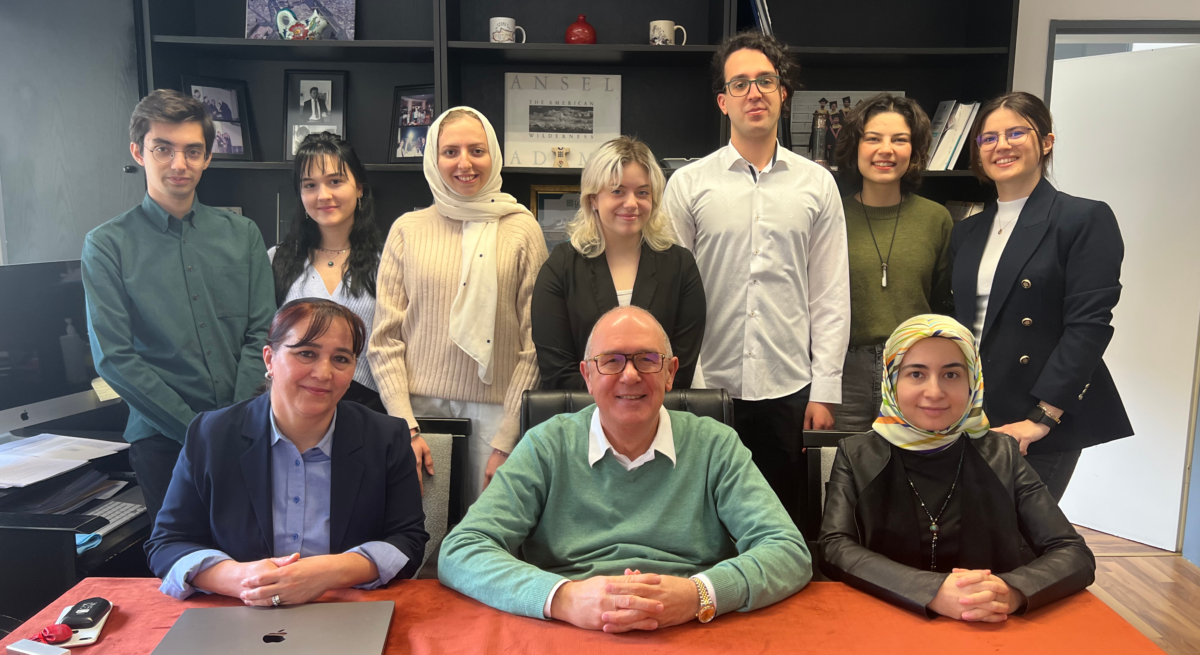
|
PROFESSOR TAYFUN ÖZÇELİK Department Chair |
|
| Office: SA-231-B Phone: +90 312 290 2139 E-mail: tozcelik@bilkent.edu.tr |
• Google Scholar profile • PubMed entries • ResearchGate profile |
Biography
Dr. Özçelik graduated from İstanbul University, İstanbul Medical School in 1986. He completed his postdoctoral work in physiology at the Ludwig-Maximilians-Universität München, and in human genetics at the Yale University School of Medicine and at the Howard Hughes Medical Institute, Stanford University School of Medicine. He returned to Turkey in 1992 as assistant professor and founding head of the Department of Genetics at DETAM, Istanbul University. In 1995, he joined the Department of Molecular Biology and Genetics at Bilkent University. He was named associate professor in 1994 and professor in 2004. He was appointed as the Dean of the Faculty of Science in 2012.
His research focuses on inherited phenotypes in humans. He contributed to the mapping of genes to human and mouse chromosomes, and identified SNRPN in Prader-Willi syndrome, PMP22 in Charcot-Marie-Tooth disease Type IA, PHKA2 in X-linked liver glycogenesis, MLH1 in MLH1-deficiency, VLDLR & WDR81 & ATP8A2 in cerebellar hypoplasia associated with quadrupedal gait in humans, HTRA2 in Parkinson’s disease and essential tremors, and RAD21 in chronic intestinal pseudo-obstruction. He introduced DNA-based individual identification to the Turkish judiciary system and also led diagnostic genetics laboratories both at Istanbul and Bilkent Universities. Currently, he works on the complex phenotypes of obesity and polycystic ovarian syndrome in collaboration with Rockefeller University. Dr. Özçelik is a member of the Turkish Academy of Sciences serving as a councilor, board member and education committee chair of the European Society of Human Genetics, program committee member of the American Society of Human Genetics, and past-president of the Turkish Society of Medical Genetics. He received the TÜBİTAK Young investigator Award in 1996, Bayındır Medical Award in 2006, and TÜBİTAK Science Award in 2012.
Research
Since our discovery of the genes that lead to Prader-Willi syndrome (PWS), hereditary sensory neuropathy (CMT1A), and glycogen storage disorder (GSD9A1) in humans 25 years ago, the primary objective of our research group has been the molecular characterization of inherited disorders. Through the extensive use of genetic mapping in our studies, we were able to identify the genes for hereditary leukemia (MLH1 deficiency), Üner Tan syndrome (CAMRQ1,2,3), Parkinson's disease (PD), essential tremors (ET) and delayed sleep phase disorder (DSPD).
However, there remain many diseases for which the causal gene mutation is not known. Especially complex diseases such as obesity, neurodegeneration, metabolic disorders, diabetes, autoimmunity, psychiatric & behavioral phenotypes. One major reason that many diseases remain unsolved at the genetic level is that the inheritance patterns of human diseases are not fully understood and analysis of human genome is not straightforward. It is therefore necessary to undertake innovative approaches that addresses the mysteries that remain between the genetic and phenotypic characteristics of humans.
We have returned our focus to a fundamental level, namely Mendelian inheritance laws, and are now examining the role of zygosity in consanguinenous families, considering not only transmission signatures and searching for the whereabouts of mutations, but also take into account the timing of their emergence. To this end, we draw on the vast body of genetic knowledge that is available through cutting-edge genome sequencing projects and propose a novel approach termed "reverse phenotyping" to uncover the determinants of complex diseases.

Arda İnan, Yasemin Ertürküner, Fatimah Safieh, Ece Kılınç, Barış Kayaalp, Zeynep Erten, Sanem Işık
Nezahat Doğan, Tayfun Özçelik, Esin Demir
Key Publications
Kars, M. E., Başak, A. N., Onat, O. E., Bilguvar, K., Choi, J., Itan, Y., Çağlar, C., Palvadeau, R., Casanova, J. L., Cooper, D. N., Stenson, P. D., Yavuz, A., Buluş, H., Günel, M., Friedman, J. M., & Özçelik, T. (2021). The genetic structure of the Turkish population reveals high levels of variation and admixture. Proceedings of the National Academy of Sciences of the United States of America, 118(36).
Zhang, Q., Bastard, P., Liu, Z., Le Pen, J., Moncada-Velez, M., Chen, J., Ogishi, M., Sabli, I., Hodeib, S., Korol, C., Rosain, J., Bilguvar, K., Ye, J., Bolze, A., Bigio, B., Yang, R., Arias, A. A., Zhou, Q., Zhang, Y., Onodi, F., Özçelik, T., … Casanova, J. L. (2020). Inborn errors of type I IFN immunity in patients with life-threatening COVID-19. Science (New York, N.Y.), 370(6515).
Onat, O. E., Kars, M. E., Gül, Ş., Bilguvar, K., Wu, Y., Özhan, A., Aydın, C., Başak, A. N., Trusso, M. A., Goracci, A., Fallerini, C., Renieri, A., Casanova, J. L., Itan, Y., Atbaşoğlu, C. E., Saka, M. C., Kavaklı, İ. H., & Özçelik, T. (2020). Human CRY1 variants associate with attention deficit/hyperactivity disorder. The Journal of Clinical Investigation, 130(7), 3885–3900.
Patke, A., Murphy, P. J., Onat, O. E., Krieger, A. C., Özçelik, T., Campbell, S. S., & Young, M. W. (2017). Mutation of the Human Circadian Clock Gene CRY1 in Familial Delayed Sleep Phase Disorder. Cell, 169(2), 203–215.e13.
